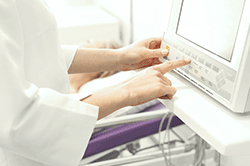Alcohol Detox Centers

When a person is physically dependent on alcohol, they will experience withdrawal symptoms if they abruptly stop or reduce use. Alcohol withdrawal is different for everyone, but the symptoms can be quite severe and even life-threatening.
When people choose not to seek withdrawal treatment and instead detox at home, they are at risk of serious complications. A primary advantage of professional alcohol detox is that patients are constantly monitored while the potentially lethal effects of acute alcohol withdrawal are medically managed.
Detox Symptoms
Withdrawal symptoms are different for everyone, and it is impossible to predict exactly what a person’s detox experience will be like.
Signs and symptoms could include any of the following:2,3

- Nausea and vomiting
- Fast heart rate
- Increased blood pressure
- Sensitivity to sound, light, and touch
- High fever
- Sweating
- Impaired judgment, focus, and memory
- Insomnia
- Irritability
- Anxiety
- Agitation
- Tremors (shakiness)
- Grand mal seizures
- Delusions, often paranoid or persecutory
- Hallucinations (auditory, visual, or tactile)
- Delirium
Alcohol detox symptoms range in severity from mild to very severe, depending on several factors. These include:3
- General health.
- Age.
- Presence of any nutritional deficiencies.
- Co-occurring medical or psychiatric conditions.
- Number of previous withdrawal episodes.
- Severity of your last withdrawal experience.
Delirium Tremens
An alcohol detox center has doctors and medical staff available to respond to cases of delirium tremens.
Delirium tremens (DTs) develops in as many as 5% of all people in alcohol withdrawal and is generally seen 2–4 days after the last drink.4 It is characterized by severe agitation, tremors, disorientation, hallucinations, and increases in breathing, heart rate, pulse, and blood pressure.3 Delirium tremens can be fatal without medical care.
Clinicians have identified some characteristics of people that are more prone to withdrawal complications, including delirium tremens and seizures. These characteristics include:6
- More severe alcohol dependence.
- Prior episodes of difficult withdrawal.
- Consuming very high levels of alcohol.
- The duration of alcohol addiction.
- Liver problems.
- Prior experiences with detox.
- Prior experience of seizures or DTs.
- Intense alcohol cravings.
- Co-occurring medical disorders.
- Older age.
- Use of other drugs, such as marijuana, cocaine, or heroin.
- More severe symptoms at the start of treatment.
An alcohol detox center has doctors and medical staff available to respond to cases of delirium tremens. Patients typically receive continuous monitoring for problems with their breathing, heart rhythm, pulse rate, blood pressure, and temperature. Facilities treat delirium tremens by recognizing it early and managing the associated seizures and agitation before they get worse.
Timeline
The timeline of alcohol detox varies from person to person but begins with your last sip of alcohol. The symptoms then fall into different places along the timeline, with varying degrees of severity.
The alcohol detox timeline is as follows:4,7,8
- 6-12 hours: insomnia, tremors, anxiety, nausea, vomiting, headache, sweating, irritability, palpitations, and lack of appetite (these symptoms intensify within 24-48 hours and improve by the 4th or 5th day)
- 12–24 hours: hallucinations, including seeing, hearing, and feeling things that are not there*
- 24–48 hours: seizures (generalized tonic-clonic or grand mal seizures)*
- 48–72 hours: delirium tremens, including hallucinations, disorientation, increased heart rate, high blood pressure, fever, agitation, and sweating*
* Typically seen in cases of more severe alcoholism
Treatment and Medications
 If you are trying to decide whether to detox at home or go to an alcohol detox center, there are a few things to consider:
If you are trying to decide whether to detox at home or go to an alcohol detox center, there are a few things to consider:
- Detox clinics are staffed by experienced doctors and nurses. They can monitor your vital signs to prevent dangerous complications.
- If you experience a lot of nausea and vomiting during withdrawal, they can give you medication to reduce nausea and administer IV fluids for dehydration.
- If you struggle with anxiety, depression, or other mental health issues, medical professionals can evaluate and treat these conditions.
Some people are surprised to learn that professional detox centers are able to administer several alcohol detox medications to manage the acute withdrawal period. These medications can make a dangerous process safer and an uncomfortable process bearable. Some medications used in alcohol detox include:4
- Benzodiazepines, which are a class of sedative drugs widely prescribed in the United States for the treatment of anxiety and seizures. These drugs include chlordiazepoxide, diazepam (Valium), and lorazepam (Ativan). They help sedate you, reduce discomfort, and prevent seizures.
- Adrenergic medications, which are not proven to prevent delirium or seizures but are often prescribed in conjunction with benzodiazepines, especially in an outpatient detox setting.
- Anticonvulsants, which are sometimes used to prevent seizures. They are less sedating than benzodiazepines and have little potential for abuse.
- Antipsychotics, which are sometimes used to treat delirium, delusions, hallucinations, and agitation. However, some of these medications can increase the risk of seizures.
Detox Centers and Programs
Alcoholism is a serious disease that requires professional treatment.
Alcohol detox programs are available in several different settings:
- Hospital. Patients with a history of severe detox symptoms, such as seizures and delirium tremens, may be safer in a hospital setting. Additionally, people with co-occurring medical or psychiatric disorders can benefit from hospital resources.
- Inpatient detox program. Specialized inpatient detox programs are often useful for people with moderate to severe alcohol use disorders. Patients live at the facility for several days or weeks and are monitored and provided detox medications, if needed. When they complete detox, they can continue treatment for alcoholism through therapy, relapse prevention training, and aftercare planning.
- Outpatient detox program. Specialized detox and recovery programs are also available on an outpatient basis for people with relatively less severe alcohol dependence. Good candidates for outpatient detox have less risk of complicated withdrawal, no co-occurring disorders, and have a sober support system at home.
- Doctor’s office. Some people benefit from outpatient detox assistance from their primary care doctor or psychiatrist.
Alcoholism is a serious disease that requires professional treatment. A detox program can help you safely get sober, but it won’t help keep you sober. You need to make a long-term recovery plan that will begin immediately following detox. Whether it is an inpatient addiction rehab, a 12-step program, or one-on-one therapy sessions, a long-term plan is the key to success.
Sources
- National Institute on Alcohol Abuse and Alcoholism. (n.d.). Alcohol Use Disorder.
- Center for Substance Abuse Treatment. (2006). Detoxification and Substance Abuse Treatment.
- Schuckit, M. A. (2014). Recognition and Management of Withdrawal Delirium (Delirium Tremens). New England Journal of Medicine, 371 (22), 2109–2113.
- Myrick, H., & Anton, R. F. (1998). Treatment of Alcohol Withdrawal. Alcohol Research and Health, 22 (1), 38.
- National Institutes of Health. (n.d.) Alcoholism and Alcohol Abuse.
- Saitz, R. (1998). Introduction to Alcohol Withdrawal. Alcohol Research and Health, 22 (1), 5.
- Bayard, M., Mcintyre, J., Hill, K. R., & Woodside Jr, J. (2004). Alcohol Withdrawal Syndrome. American Family Physician, 69 (6).
- American Psychiatric Association. (2013). Diagnostic and Statistical Manual of Mental Disorders (5th ed.). Arlington, VA: American Psychiatric Publishing.
